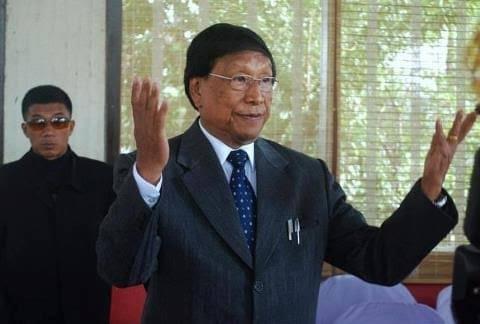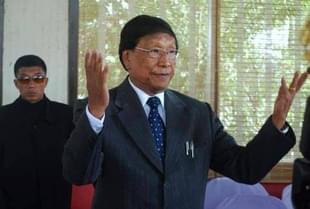Politics
Time For New Delhi To Call Naga Rebel Leader Muivah’s Bluff And Sign The Peace Deal
Jaideep Mazumdar
Sep 05, 2020, 02:31 PM | Updated 02:31 PM IST
Save & read from anywhere!
Bookmark stories for easy access on any device or the Swarajya app.


The National Socialist Council of Nagaland (NSCN) faction led by Thuingaleng Muivah has just issued a threat to the Union Government: that the rebel outfit will resume hostilities if its demands are not met.
The primary demands of the outfit, which has been in talks with the Government of India for the past 23 years, are a separate flag and Constitution for Nagaland, and inclusion of Naga-inhabited areas of neighbouring states of Manipur, Assam and Arunachal Pradesh in a loose administrative arrangement.
New Delhi has repeatedly rejected these demands, and after a point of time, the rebel outfit also fell silent on them.
The most contentious demand--that of integrating Naga-inhabited areas of the neighbouring states with Nagaland--was rejected outright since the three states were vehemently opposed to it.
The Naga demand for a separate flag and constitution was also rejected since the Indian Constitution does not have any provision for a constituent State having a separate flag or constitution.
The two sides signed a framework agreement in the presence of Prime Minister Narendra Modi in August 2015. The agreement, made public by the NSCN last month, said that “the dialogue between the Government of India and the NSCN has successfully concluded and we are confident it will provide for an enduring inclusive new relationship of peaceful co-existence of the two entities”.
It ends with: “The two sides agreed that within this framework agreement the details and execution plan will be worked out and implemented shortly”.
But five years of discussions and negotiations have not been able to produce a final deal. Meanwhile, Nagaland governor R.N. Ravi, who is also the interlocutor of the talks with the Muivahs’s NSCN, reached out to other Naga rebel groups and various other organisations as well as civil society.
Muivah’s hegemony and depredations
The NSCN faction led by Muivah has always laid claim to being the sole representative of the Naga people. In order to establish its hegemony, it has attacked and killed leaders and cadres of rival Naga outfits and threatened, coerced or silenced discordant voices.
Many Nagas have long resented the strong-arm tactics of Muivah’s NSCN and the fact that Muivah and many others in that outfit did not belong to Nagaland state. Muivah is a Tangkhul, a tribe that inhabits a hill district of neighbouring Manipur. Many leaders and cadres of his outfit are also Tangkhuls.
Ravi’s reaching out to other rebel outfits, which are collectively called Naga National Political Groups (NNPGs), and other organisations and leaders of civil society did not go down well with Muivah who felt his hegemony being threatened.
Extortions and lawlessness
Over the last 23 years since a ceasefire agreement came into force and hostilities ceased, the Naga rebel outfits have become a law unto themselves. Taking advantage of the loosely worded ceasefire ground rules, they have been extorting huge sums of money from businessmen, contractors, government employees and even the poor.
The extortions fund lavish lifestyles of leaders of the rebel outfits, especially Muivah’s NSCN, and are also used to buy arms. The rebel outfits are also engaged in many illicit activities like smuggling arms and drugs.
Ravi has rightly hit out at these ‘armed gangs’ and asked the state government to act against them. Ravi, who was a special director of the Intelligence Bureau (IB), has said that the ‘organised armed gangs’ were running parallel governments and challenging the legitimacy of the state.
The Nagaland Governor (Ravi) also sought to sever the link between government employees and rebel outfits by asking all government employees to declare if their relatives or friends were members of the outfits.
In his Independence Day speech, Ravi said that Nagaland was the ‘worst-performing state’ and blamed ‘vested interests’ for the mess that the state is in today.
Ravi’s moves and utterances have not gone down well with Muivah and his outfit, and his political backers in Nagaland. That is why the NSCN has been demanding that Ravi be replaced as interlocutor, a demand that New Delhi has rightly ignored.
But the Governor’s interventions have been widely welcomed by the long-suffering common citizenry of Nagaland. Most Nagas who are not beneficiaries of corruption and mis-governance are fed up with the way things stand in the State and want normalcy with a functional government and rule of law (read this interview of Nagaland’s five-time chief minister S.C. Jamir).
That is why most people of Nagaland want the conclusion of talks and a final peace deal.
Muivah is wary of a deal that involves rival outfits and other civil society bodies since their involvement in a final peace deal would undermine his importance and hegemony. That is why he has resurrected the demand for a separate flag and constitution for Nagaland, knowing fully well that New Delhi will never agree to those demands.
An empty threat
The threat issued by Muivah--that his cadres will resume hostilities--is an empty one. All leaders and cadres of his outfit have become used to lavish and easy lifestyles and might never return to the inhospitable jungles to fight Indian security forces.
Muivah, aged 86, is too old to lead his men as a guerilla. He also knows that few of his cadres will heed his call to take up arms again.
Muivah would also be aware of many other ground realities: that his armed cadres will not find safe refuge in Myanmar and Bangladesh as was the case in the past. The international community is no longer tolerant of insurgency and terrorism.
And there is no way NSCN cadres can slip away from their designated camps, including the outfit’s headquarters (Camp Hebron). Indian security forces have stepped up vigil, including along the Indo-Myanmar border, to foil such bids.
Muivah is also aware that the Nagas (of Nagaland) have run out of patience and want a peace deal concluded at the earliest.
Hence, there is no reason for New Delhi to baulk at the latest threat issued by the NSCN. Instead, it should call Muivah’s bluff and go ahead with a final peace deal with or without Muivah.
Jaideep Mazumdar is an associate editor at Swarajya.





